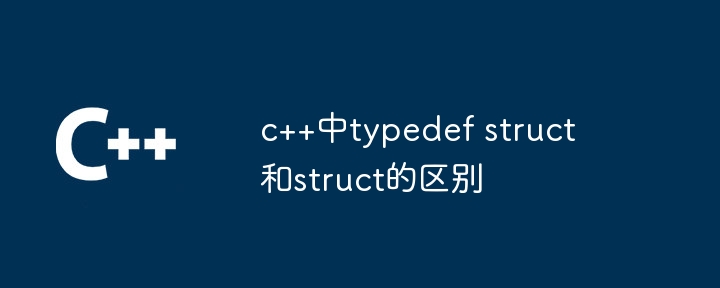The difference between typedef struct and struct in c++
typedef struct和struct的区别:typedef struct创建结构体类型的别名,而struct定义新的结构体类型。typedef struct创建的别名在声明之后即可使用,而struct定义的结构体在定义之后才可使用。typedef struct和struct都不会创建额外的存储空间。

typedef struct和struct的区别
在C++中,typedef struct和struct的区别在于:
-
别名与定义:
-
typedef struct为现有struct类型创建别名,它仅定义一个新的类型名称,不会创建新的结构体。 -
struct用于定义一个新的结构体类型,它创建一个新的数据结构。
-
-
使用方式:
-
typedef struct创建的别名可以用作类型名称,就像普通类型一样。 -
struct定义的结构体可以使用结构体名称来引用。
-
-
可访问性:
-
typedef struct创建的别名在整个源文件中都可访问,即使在别名声明之后。 -
struct定义的结构体只有在结构体定义之后才可访问。
-
-
存储空间:
-
typedef struct和struct都不会创建额外的存储空间,它们只是方便地引用或创建结构体。
-
示例:
// 定义一个结构体
struct Point {
int x;
int y;
};
// 为结构体创建别名
typedef struct Point PointAlias;在上面的示例中,PointAlias是Point结构体的别名,可以通过以下方式使用:
PointAlias point; // 声明一个PointAlias类型的变量 point.x = 10; // 访问变量的成员
总结:
-
typedef struct创建结构体类型的别名,而struct定义新的结构体类型。 -
typedef struct创建的别名在声明之后即可使用,而struct定义的结构体在定义之后才可使用。 -
typedef struct和struct都不会创建额外的存储空间。
The above is the detailed content of The difference between typedef struct and struct in c++. For more information, please follow other related articles on the PHP Chinese website!

Hot AI Tools

Undresser.AI Undress
AI-powered app for creating realistic nude photos

AI Clothes Remover
Online AI tool for removing clothes from photos.

Undress AI Tool
Undress images for free

Clothoff.io
AI clothes remover

AI Hentai Generator
Generate AI Hentai for free.

Hot Article

Hot Tools

Notepad++7.3.1
Easy-to-use and free code editor

SublimeText3 Chinese version
Chinese version, very easy to use

Zend Studio 13.0.1
Powerful PHP integrated development environment

Dreamweaver CS6
Visual web development tools

SublimeText3 Mac version
God-level code editing software (SublimeText3)

Hot Topics
 How to implement the Strategy Design Pattern in C++?
Jun 06, 2024 pm 04:16 PM
How to implement the Strategy Design Pattern in C++?
Jun 06, 2024 pm 04:16 PM
The steps to implement the strategy pattern in C++ are as follows: define the strategy interface and declare the methods that need to be executed. Create specific strategy classes, implement the interface respectively and provide different algorithms. Use a context class to hold a reference to a concrete strategy class and perform operations through it.
 How to implement nested exception handling in C++?
Jun 05, 2024 pm 09:15 PM
How to implement nested exception handling in C++?
Jun 05, 2024 pm 09:15 PM
Nested exception handling is implemented in C++ through nested try-catch blocks, allowing new exceptions to be raised within the exception handler. The nested try-catch steps are as follows: 1. The outer try-catch block handles all exceptions, including those thrown by the inner exception handler. 2. The inner try-catch block handles specific types of exceptions, and if an out-of-scope exception occurs, control is given to the external exception handler.
 How to use C++ template inheritance?
Jun 06, 2024 am 10:33 AM
How to use C++ template inheritance?
Jun 06, 2024 am 10:33 AM
C++ template inheritance allows template-derived classes to reuse the code and functionality of the base class template, which is suitable for creating classes with the same core logic but different specific behaviors. The template inheritance syntax is: templateclassDerived:publicBase{}. Example: templateclassBase{};templateclassDerived:publicBase{};. Practical case: Created the derived class Derived, inherited the counting function of the base class Base, and added the printCount method to print the current count.
 How to handle cross-thread C++ exceptions?
Jun 06, 2024 am 10:44 AM
How to handle cross-thread C++ exceptions?
Jun 06, 2024 am 10:44 AM
In multi-threaded C++, exception handling is implemented through the std::promise and std::future mechanisms: use the promise object to record the exception in the thread that throws the exception. Use a future object to check for exceptions in the thread that receives the exception. Practical cases show how to use promises and futures to catch and handle exceptions in different threads.
 Why does an error occur when installing an extension using PECL in a Docker environment? How to solve it?
Apr 01, 2025 pm 03:06 PM
Why does an error occur when installing an extension using PECL in a Docker environment? How to solve it?
Apr 01, 2025 pm 03:06 PM
Causes and solutions for errors when using PECL to install extensions in Docker environment When using Docker environment, we often encounter some headaches...
 Quantitative currency trading software
Mar 19, 2025 pm 04:06 PM
Quantitative currency trading software
Mar 19, 2025 pm 04:06 PM
This article explores the quantitative trading functions of the three major exchanges, Binance, OKX and Gate.io, aiming to help quantitative traders choose the right platform. The article first introduces the concepts, advantages and challenges of quantitative trading, and explains the functions that excellent quantitative trading software should have, such as API support, data sources, backtesting tools and risk control functions. Subsequently, the quantitative trading functions of the three exchanges were compared and analyzed in detail, pointing out their advantages and disadvantages respectively, and finally giving platform selection suggestions for quantitative traders of different levels of experience, and emphasizing the importance of risk assessment and strategic backtesting. Whether you are a novice or an experienced quantitative trader, this article will provide you with valuable reference
 How does C++ memory management optimize memory usage?
Jun 05, 2024 pm 10:41 PM
How does C++ memory management optimize memory usage?
Jun 05, 2024 pm 10:41 PM
Optimization techniques for C++ memory management include: using smart pointers (RAII), reducing frequent allocations, avoiding unnecessary copies, using low-level APIs (with caution), and analyzing memory usage. Through these techniques, such as using smart pointers and caching in image processing applications, memory usage and performance can be significantly optimized.
 What are the AI hardware design tools?
Nov 29, 2024 am 08:37 AM
What are the AI hardware design tools?
Nov 29, 2024 am 08:37 AM
AI hardware design tools include: EDA tools such as Cadence Innovus and Synopsys IC Compiler for integrated circuit layout and verification. SoC design platforms such as Xilinx Vivado Design Suite and Intel FPGA SDK for FPGA and SoC development. Deep learning frameworks, such as TensorFlow and PyTorch, are used to build and train deep learning models. Hardware modeling and simulation tools, such as Synopsys VCS and ModelSim, are used to verify and simulate hardware designs. Other tools like Chisel,






